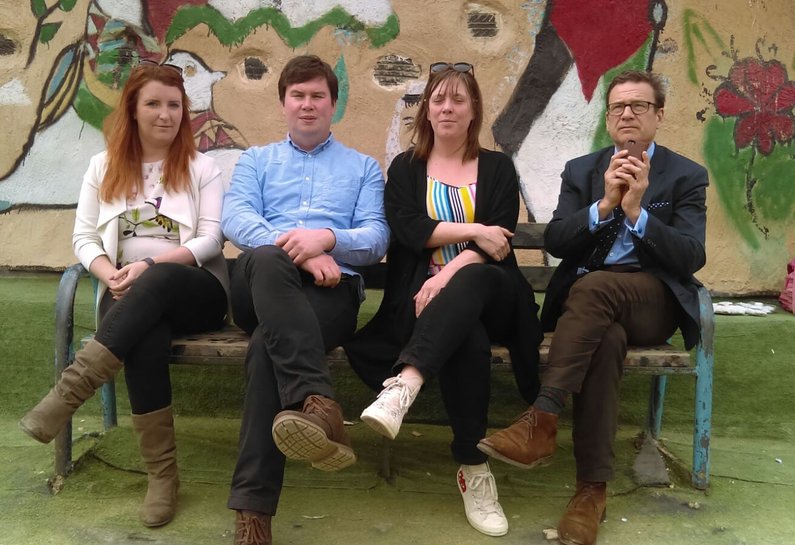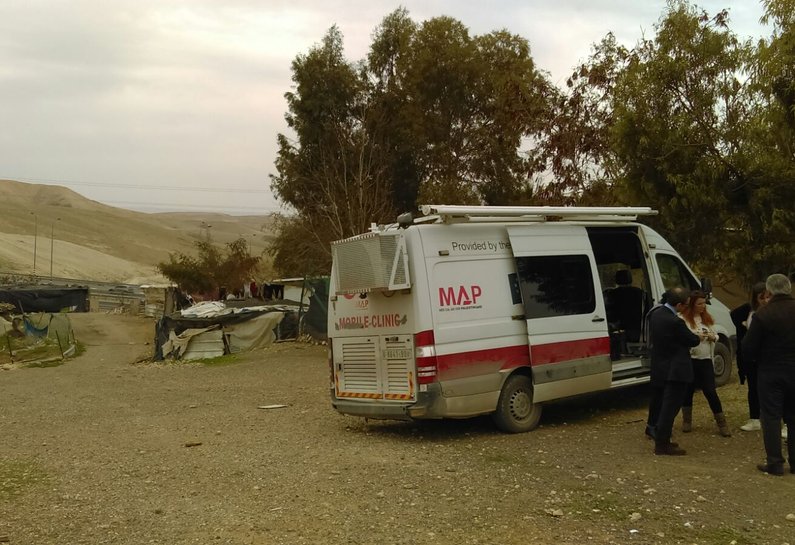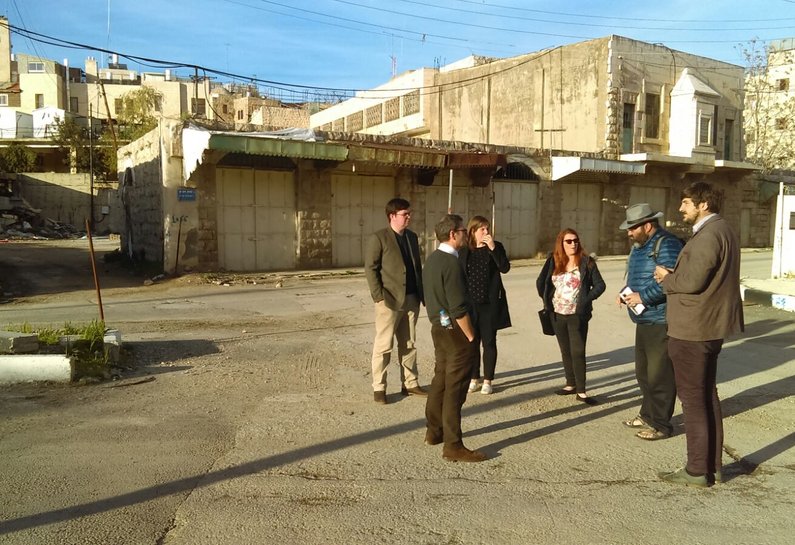Latest delegation of British MPs return from MAP-Caabu visit to the West Bank

Last week witnessed the first Caabu and MAP-supported parliamentary delegation to the West Bank of 2018. The MPs were: Bob Seely (Isle of Wight, Conservative), member of the Foreign Affairs Select Committee; Dan Carden (Liverpool Walton, Labour), Shadow Minister for International Development; Jess Phillips (Birmingham Yardley, Labour); and Louise Haigh (Sheffield Heeley, Labour), Shadow Spokesperson on the Police.
MAP’s Director of Advocacy and Campaigns, Neil Sammonds, reports on what the MPs witnessed on their visit:
We and the MPs willingly pushed through a punishing early Monday to late Friday itinerary. Following briefings by the British Consul General and team, the UN and the Jerusalem Legal Aid Centre, our group visited areas in and around Jerusalem which have become increasingly sensitive since US President Trump’s announcements on the city.
Senior staff at al-Makassed Hospital in East Jerusalem welcomed us, apologising for the fact that their Director, Dr Rafiq al-Husseini, had been denied re-entry to Israel and as such could not enter Jerusalem to work and had had regretfully to resign. We heard from other staff and patients about the restrictions on movement which obstructed their own medical work and healthcare. It was shocking to see newly-born triplets in incubators in the neonatal ward and learn that the mother, who had given birth by C-section, was about to have to return to Gaza alone, without her babies, because her permit would expire. She would likely be unable to return for two months, during which time they would be unable to bond together, the babies would be unable to be breastfed and mental and physical development would suffer.

In Aida Refugee Camp, near Bethlehem, UNRWA representatives and Palestinian refugees explained for us the history of the camp, whose geographical size has barely grown over 70 years despite considerable population growth, and multiple challenges faced by its residents. Of particular concern was the high frequency of violent raids by Israeli security forces into the camp and the repeated, excessive use of tear gas, to which all residents were found to have been exposed and which was particularly harmful in dense living conditions.
Guided by Military Court Watch, our group attended sessions of the Israeli Military Court at Ofer where we met with families of defendants, many of them children, and saw close up many of the well-documented ways in which the system abuses the rights of juveniles and others. Several people told us that child and other defendants would “confess” to offences they had not committed and for which no evidence was often provided, knowing that the system works against them and to seek to challenge invariably leads to a longer time in prison.
In Hebron, the MPs were briefed by Breaking The Silence and shown the painful impact of “cleansing” policies on the city’s once thriving city centre. The shut-down market areas and surrounding residential streets are almost devoid of life, with barely a handful of Palestinians remaining amid the settlers, Israeli soldiers, racist graffiti and stray cats. Issa Amro of Youth Against Settlements spoke of his organisation’s non-violent activism and the multiple charges levied against him by both the Israeli authorities and the Palestinian Authority.

East of Jerusalem towards the Jordan Valley, the MPs saw the MAP-supported mobile clinic on its fortnightly visit to Khan al-Ahmar. This is a Bedouin community originally from the Negev/Naqab but made refugees after the creation of the State of Israel, who are once more at serious risk of being forcibly transferred and face significant restrictions on their ability to develop their communities or access services such as healthcare. We heard of settlers harassing and sometimes attacking the community, killing and stealing their goats and firing intimidatory bullets at night. The following day, we heard, a goatherder in a nearby community was shot and seriously wounded. Perpetrators are rarely brought to justice. Little wonder that poverty, malnutrition and stunting are on the rise.
Going north up the Jordan Valley, researchers from al-Haq showed us how so much Palestinians’ rich agricultural land in this area has been steadily and systematically taken away from them, to be exploited by settlements and their industries. The expropriation of such resources gains Israel and robs the Palestinian economy of billions of dollars a year.
Among other activities, the MPs met with a senior representative of the Palestinian Authority, a senior spokesman of the Israeli Foreign Ministry, a retired Israeli Supreme Court judge, a small settler-Palestinian “coexistence” group and an inspiring women’s rights organisation, Women's Centre for Legal Aid and Counselling (WCLAC), in Jerusalem.
The MPs told MAP and Caabu that they found the trip highly informative and very well organised, and looked forward to keeping in touch.

